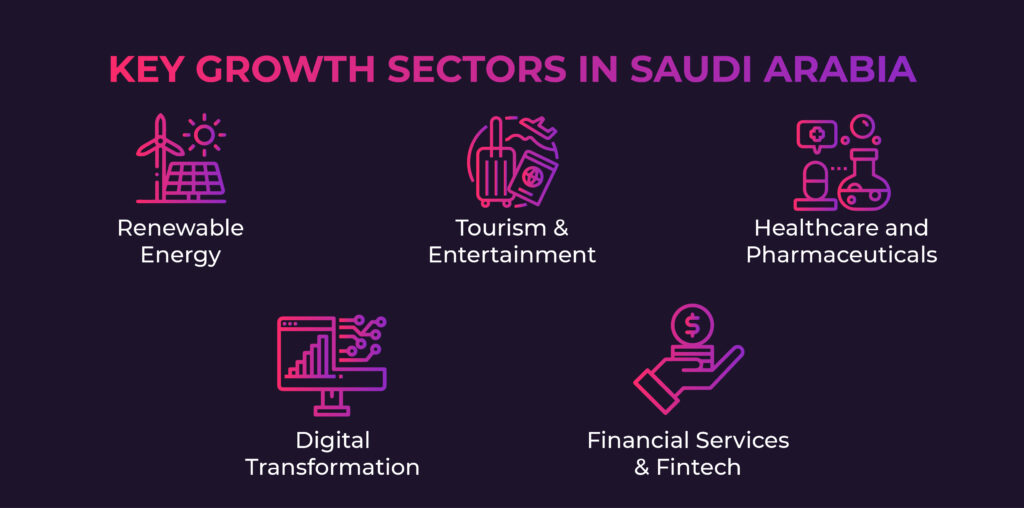Propelled by Vision 2030, the Kingdom of Saudi Arabia (KSA) is focused on building a future that’s rooted in diversification, and sustainability. The region has been quite successful in expanding its economy beyond oil and gas.
At the same time, this diversification has made this Gulf market highly fertile for businesses as it is brimming with investment opportunities across different industrial sectors.
For investors interested in business incorporation in Saudi Arabia, getting a clear picture of the present scenario is important. They must know the key industries with maximum growth potential and what challenges to anticipate while seeking a compliant entry and setup into the region.
This article will cover key industries in Saudi Arabia, highlighting the sectors ripe with maximum profits, as well as crucial considerations for investors when establishing operations in the Kingdom.
KEY GROWTH SECTORS IN SAUDI ARABIA

1. Renewable Energy
The main motto of Vision 2030 is reducing its reliance on oil by focusing on renewable energy sources like solar, wind, and green hydrogen. Projects such as the $500 billion NEOM initiative aim to develop the world’s largest green hydrogen plant, with ambitions to produce 50% of its electricity from renewables by 2030.
- Government Incentives: Entities like the Saudi Industrial Development Fund (SIDF) offer access to funding and tax exemptions for renewable projects.
- Long-Term Potential: Solar, wind, and energy storage will continue growing, creating long-term opportunities for companies.
2. Tourism & Entertainment
Saudi Arabia’s tourism and entertainment sector is a flourishing one, with a government target of 100 million visitors annually by 2030. Projects like Qiddiya, the Red Sea Project, and Al-Ula aim to make the Kingdom a top global tourism destination, blending adventure travel, cultural heritage, and luxury.
- Tourism Infrastructure: High demand exists for hotels, resorts, theme parks, and restaurants.
- Entertainment Ventures: As restrictions lift, cinemas, concerts, and festivals offer new investment possibilities.
3. Healthcare and Pharmaceuticals
With healthcare investment projected to reach $50 billion by 2025, Saudi Arabia presents a lucrative business opportunity in this sector. The Kingdom has made significant investments in healthcare infrastructure, digital health solutions, and medical research.
- Private Healthcare: A growing middle class and aging population drive demand for private clinics and hospitals.
- Digital Health: Areas like telemedicine and AI diagnostics are highly valued as Saudi Arabia enhances healthcare access.
4. Technology
Saudi Arabia’s Information and Communication Technology (ICT) sector is integral to its Vision 2030 project. With heavy investments pouring into 5G infrastructure, e-government services, and smart cities, Saudi is witnessing a rapid digital transformation.
- Tech Startups: Programs like Misk Innovation and the Saudi Data & AI Authority (SDAIA) offer funding and training for tech entrepreneurs.
- Smart Cities: Initiatives like NEOM and Al Widyan offer entry points in IoT, AI, and infrastructure development.
5.Financial Services & Fintech
Saudi Arabia’s financial services industry, particularly fintech, is undergoing a paradigm shift with an aim of having 525 FinTech firms established by 2030. With support from the Saudi Central Bank and Capital Market Authority, fintech innovation is on the peak.
- Digital Payments Solutions: Demand for cashless transactions, digital wallets, and neobanking is high.
- Blockchain & Cryptocurrency: Opportunities exist for blockchain technology as Saudi Arabia focuses on the development of financial applications.
While Saudi Arabia’s investment appeal is significant, investors must consider regulatory and operational factors carefully as they often pose serious challenges, and multiple things can go wrong if one does not address them properly.
Understanding Local Regulations
Saudi Arabia’s regulatory landscape keeps changing from time to time, with new rules always coming in to facilitate foreign investment. However, the changing regulations can often confuse investors. A few key aspects to take note of while understanding the licensing and registration process include:
- Having a basic knowledge of the legal and business structure.
- Knowing about necessary licenses and permits before starting operational processes.
- Learn about sector-specific regulations, especially for industries like healthcare and finance.
- Understanding the setup structure and regulations that define business partnerships.
Taxation Policies
Saudi Arabia’s tax system can be complex for foreign companies. VAT, zakat (an Islamic tax), and corporate income tax apply to most foreign-owned businesses. Here’s what investors can do to avoid mistakes:
- Seek tax advice to understand VAT obligations and corporate income tax.
- Learn about tax regulations and compliance rules to avoid penalties and audits.

Summing Up
Saudi Arabia’s Vision 2030 has catalyzed growth across multiple sectors, opening profitable venture possibilities in renewable energy, tourism, healthcare, ICT, and fintech.
However, establishing a business in the Kingdom requires careful planning, local law knowledge, and cultural alignment. Saudi Arabia offers access to a dynamic economy and the broader MENA (Middle East and North Africa) market for investors ready to enter
But to overcome the challenges and avoid pitfalls, investors will need assistance of experts who can help them with complete compliant setup and procure the necessary permissions and approvals on their behalf.
With the right approach and partnerships, investors can unlock substantial returns and sustained growth in the region.

